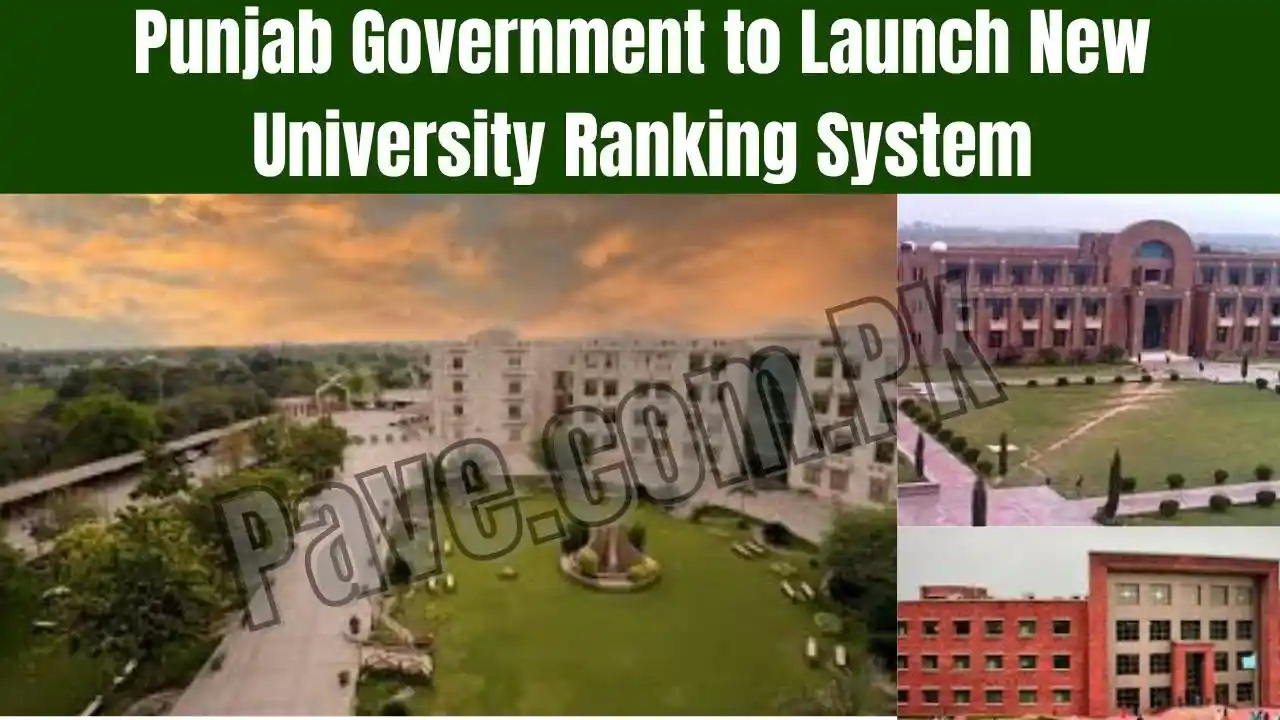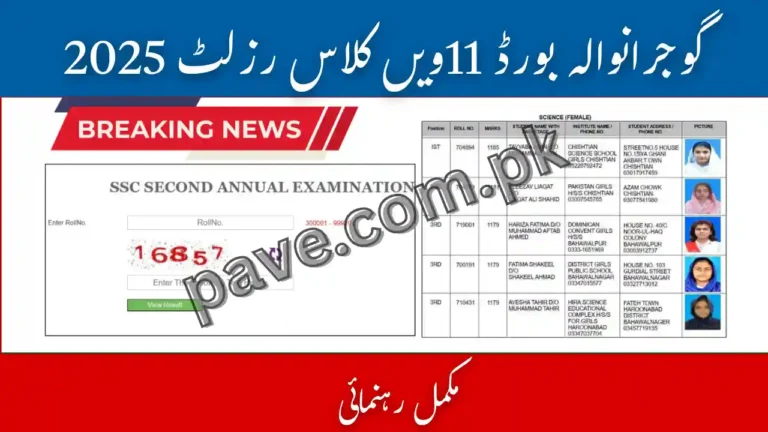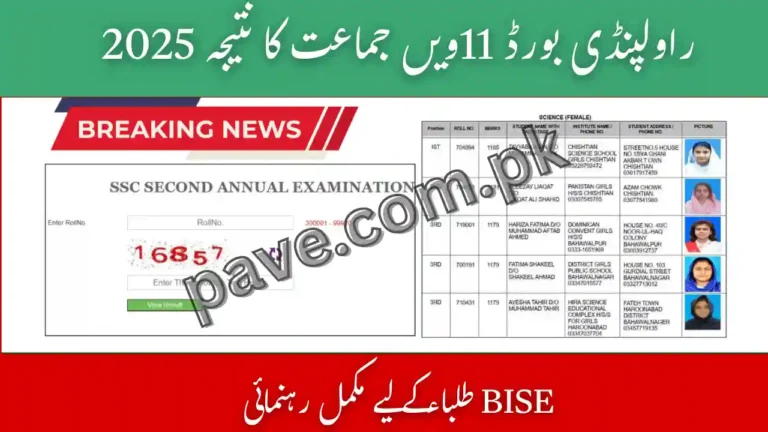Latest Updates:Punjab Government to Launch New University Ranking System
The Punjab Government has officially confirmed the launch of a new university ranking system that will evaluate higher education institutions across the province using modern, transparent, and internationally aligned criteria. This decision comes at a crucial moment in Pakistan’s educational timeline, where universities face mounting pressure to improve academic standards, strengthen research output, and prepare graduates for a rapidly evolving job market.Punjab Government to Launch New University Ranking System
For decades, students and parents have been forced to depend on informal reviews, marketing claims, or outdated reputation to judge a university’s quality. The absence of a credible ranking mechanism allowed weak institutions to thrive, misleading thousands of students annually. The new ranking model aims to introduce accountability, data-driven evaluation, and merit-based reporting that will directly influence how universities operate.
With Pakistan’s youth population increasing, and local industries demanding skill-oriented professionals, this ranking system is expected to bring urgently needed reforms throughout the academic ecosystem.
Historical Context: A Flawed Education Selection Culture
Historically, Pakistan’s higher education decisions have been influenced by:
- Branding and campus size
- Marketing campaigns
- Social reputation
- Alumni hype
- City location
This frequently disadvantages talented students who do not have access to authentic academic evaluation. The new ranking system intends to replace guesswork with reliable, evidence-based data.
Read Also: Breaking News: ASF Test Venues Revealed for New Recruitment 2025
How the Ranking System Will Transform Governance
The Punjab Government plans to collect periodic performance reports from universities through a central monitoring system. Indicators will include:
- Annual research benchmarks
- Graduate employment outcomes
- Funding utilization reports
- Faculty development records
- Student welfare initiatives
Universities failing to meet improvement targets may face:
- Reduced funding
- Restricted admissions
- Administrative restructuring
- Loss of accreditation in extreme cases
This introduces cultural accountability rarely seen in the region’s academic management.
Curriculum Modernization and Industry Alignment
One of the ranking criteria will evaluate the practical relevance of degree programs. Pakistan currently produces thousands of graduates in disciplines where local job markets are already saturated. Meanwhile, industries struggle to find talent in:
- Artificial intelligence
- Data analytics
- Cloud computing
- Cybersecurity
- Biomedical technology
- Renewable energy engineering
Universities will be encouraged to adopt flexible curricula that respond directly to domestic and international workplace demands.
Strengthening Research Culture
The current research ecosystem suffers from insufficient funding, lack of supervision, and limited international collaboration. Under the ranking system, universities will be evaluated based on:
- Number of research publications
- Quality and impact score
- Ethical guidelines compliance
- Cross-disciplinary innovation
- International conference participation
- Patent applications
Institutions failing to advance research standards may be ranked lower, motivating them to invest in labs, grants, and faculty mentorship programs.
Enhancing Faculty Competency and International Exposure
The ranking system will track:
- Percentage of foreign-qualified PhD faculty
- Faculty turnover rate
- Student satisfaction surveys
- Research mentorship performance
- Short courses and certification achievements
In the future, promotion eligibility may depend on measurable academic contribution, not merely years of service.
Infrastructure Evaluation Categories
Physical and digital infrastructure will be scored based on:
- Library digital archive access
- Modern laboratory equipment
- Smart classroom integration
- Accessibility for differently-abled students
- Hostel cleanliness and security
- Connectivity and campus networking facilities
This encourages universities to invest in long-term asset development.
Fostering Entrepreneurial Mindsets
The ranking system will reward universities that support:
- Startup incubators
- Entrepreneurial competitions
- Business mentorship programs
- Industry advisory boards
- Internship pipelines
- Patent commercialization
This aligns Pakistan with global education dynamics where universities serve as innovation factories rather than passive lecture institutions.
Impact on Private Sector Expansion
A reputable ranking model will:
- Give clarity to international investors
- Attract foreign collaborations
- Encourage public-private partnerships
- Promote academic tourism
- Increase university credibility beyond borders
Private universities capable of rapid innovation may climb rankings faster than traditional institutions.
Read Also: Check 8171 Payment Status 2025 Online Complete Guide
Data Transparency and Public Accessibility
Rankings may eventually be published through:
- Public government portals
- Student counseling platforms
- Print media reports
This transparency will democratize decision-making for families across socio-economic backgrounds.
Challenges and Risks
Achieving fair ranking accuracy requires caution. Potential risks include:
- Political influence on scoring
- Subjective faculty reactions
- Resistance from outdated institutions
- Administrative corruption
- Data manipulation attempts
The government must employ independent third-party evaluators, introduce strict auditing, and enforce penalties for misinformation.
International Benchmark Compatibility
Punjab’s ranking system is expected to align with:
- QS World University Rankings
- Times Higher Education metrics
- Shanghai Ranking standards
This alignment will improve:
- Exchange program approvals
- Joint research ventures
- Recognition of Pakistani degrees abroad
These outcomes help graduates seeking international employment or postgraduate admissions.
Long-Term Vision
Over the next decade, the government aims to:
- Narrow the skill gap between graduates and industry
- Increase Pakistan’s presence in global research journals
- Improve digital literacy across campuses
- Support female higher-education enrollment
- Strengthen STEM capabilities
Ultimately, the ranking system is not just a list—it is a performance catalyst.
Societal Benefits
The cumulative benefits include:
- Higher graduate productivity
- Tech ecosystem expansion
- Better academic ethics
- Reduced brain drain
- Stronger national branding
When universities improve, the entire economy advances.
Read Also:Check 8171 Payment Status 2025 Online Complete Guide
Conclusion
The Punjab Government’s decision to launch a new university ranking system represents a comprehensive rethinking of higher education priorities. By introducing evidence-based evaluation, this system encourages universities to improve teaching quality, expand research horizons, upgrade digital readiness, and strengthen industry linkages.
If executed with integrity and consistency, this ranking framework will empower students, guide employers, reform weak administrators, and reshape institutional culture. Over time, Punjab could see improved global recognition, increased innovation output, and a more skilled workforce prepared to meet domestic and international challenges.
Pakistan’s future rests on its educational foundations. This ranking system is a crucial step toward elevating those foundations from mediocrity toward excellence.







